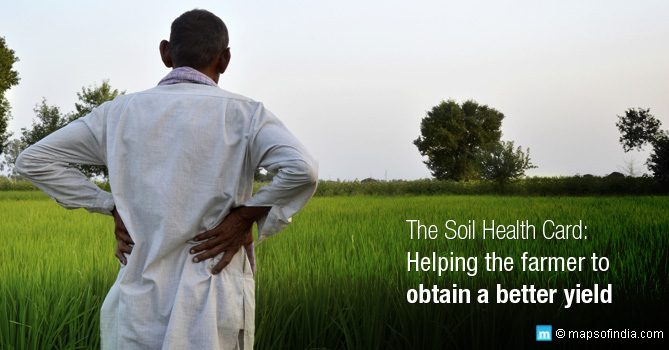In February 2015, the Narendra Modi government had launched the Soil Health Card Scheme. Under this programme, the government plans to issue soil card to farmers to help them get a good harvest by studying the quality of soil. According to the scheme, the objective is to issue the soil cards to about 14 crore farmers spread all over India. The card is a printed report. It will be given to farmers once in three years for his farm or land holding.
What is soil health card?
The soil health card studies and reviews the health of soil or rather we can say a complete evaluation of the quality of soil right from its functional characteristics, to water and nutrients content and other biological properties. It will also contain corrective measures that a farmer should adopt to obtain a better yield.
How does it help the farmers?
- With the issue of the card, the farmers will get a well-monitored report of the soil which is chosen for cultivation of crops.
- The monitoring will be done on a regular basis.
- The farmers will be guided by experts to come up with solutions to improve the quality of the soil.
- Regular monitoring will help the farmers to get a long-term soil health record and accordingly can study and evaluate the results of different soil management practices.
- This card can become most helpful and effective when filled out regularly by the same person over a period of time.
- The idea is not to compare the varied soil types but to find out methods to improve soil fertility, to access the different types of soil and their ability to support crop production in spite of their limitations and as per their abilities.
- The soil card will help the farmers to get an idea on the crop-wise recommendations of nutrients and fertilizers required in each type of soil. This can help in increasing the crop yield.
The Process
The various soil testing laboratories in the country will carry out the testing of the soil samples, the results of which will be analysed by the experts. The results are related to the strength and weaknesses of the soil. The experts also suggest methods to improve the soil quality. These results and suggestions are displayed in the soil health cards.
How far is the scheme successful?
With the launch of the scheme in February 2015, in the first phase, the target was to cover 84 lakh cards. But till July 2015, 34 lakh cards have been issued. This is a flagship programme for the agricultural sector of the country. Among all the states in India, it is Andhra Pradesh which has taken the lead in distribution of the Soil Health Cards to farmers. Two other states, Tamil Nadu and Punjab have collected the maximum amount of soil samples for testing during the kharif season. However, Tamil Nadu has not distributed the cards yet. Other states which are taking the lead are Uttar Pradesh, Punjab, Chhattisgarh, Telangana and Odisha. Farmers in states like Haryana, Kerala, Mizoram, Arunachal Pradesh, Sikkim, Tamil Nadu, Goa, Gujarat, Uttarakhand and West Bengal have not been issued a single card as against the targets set for them for 2015-16.
Launching of soil health card web portal
In order to make the scheme more successful, the government of India, along with the agriculture department of India, has launched a soil health card agriculture portal. In fact two other agri-portals have been recently launched – Fertiliser Quality Control System and Participatory Guarantee System portal.
What is the soil health card portal?
The farmers need to register at the web portal www.soilhealth.dac.gov.in along with the details of the soil samples and test lab reports. Once registered, the farmer can keep a track of the following in the portal:
Soil Samples Registration
- Test Results by Soil Testing Labs
- Fertilizer and Nutrients Recommendations
- Soil Health Card generation
- MIS module for monitoring progress
The basic objective behind the launch of the web portal is to create a single national database on soil health which can be used in the future for research and planning both by farmers and soil experts. Right now the portal is in English. Very soon, it will have content in regional languages too.
Related Information:
Fertiliser Quality Control System (FQCS) portal
Participatory Guarantee System (PGS)
Nagar Van Udyan Yojana
Pradhan Mantri Krishi Sinchai Yojana
PM Modi’s Agricultural Reforms Agenda
Major Soil Types
Soil Map of India
Is organic farming a viable option in India?
Causes of rural poverty and Anti poverty schemes in India
The Cotton Cultivation and Export Sector of India : An Overview
What is Kejriwal’s Gajendra Singh Kisan Sahayata Yojana?





